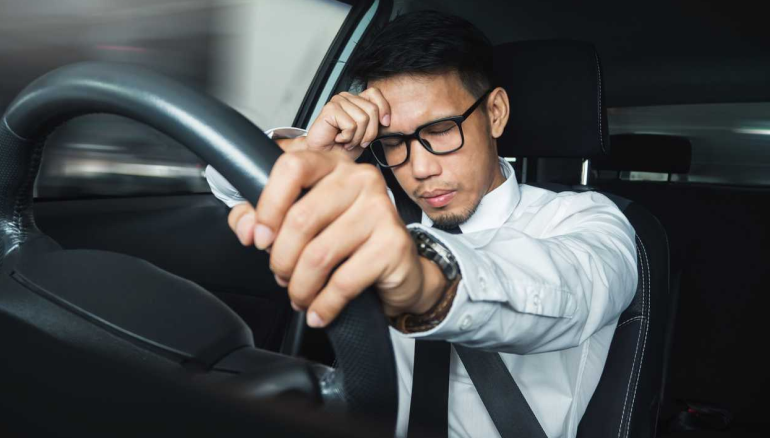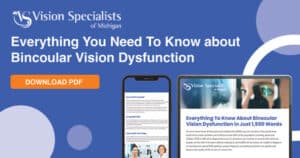Driving is an activity that demands complete attention, coordination, and focus. While some drivers have mastered the art of navigating the roads, others might occasionally feel dizzy when behind the wheel. The sensation can be unnerving and unsafe, not only for the driver but also for others on the road. But why does this happen?
Why Am I Dizzy While Driving?


What is Binocular Vision Dysfunction?
Our eyes are designed to work in tandem. When both eyes properly align and focus on an object, the brain merges these two images into one clear picture. However, in individuals with BVD, the eyes are misaligned, even if ever so slightly. This misalignment forces the eye muscles to overwork, constantly trying to correct the alignment to achieve a single, clear image. The excessive strain on the eye muscles can lead to symptoms such as dizziness, headaches, anxiety, and balance problems, especially during activities requiring depth perception and focus, like driving. People commonly experience dizziness while driving if they have BVD, or in many cases when they have Vertical Heterophoria.Understanding Vertical Heterophoria
Vertical Heterophoria (VH) is a subtype of BVD where the misalignment is vertical, meaning one eye sees an image slightly above the level of the other. Although the misalignment might be minuscule, it's enough to throw off the harmony of binocular vision. People with VH often aren’t even aware of this subtle misalignment. However, their eyes continuously make micro-adjustments in an attempt to align the images, leading to the overstrain of eye muscles. Many people with Vertical Heterophoria may feel sensations of vertigo while driving. However, vertigo is a sensation of motion or spinning, but often the underlying cause of this feeling in patients is connected to their eyes. Dizziness, lightheadedness, balance problems, anxiety, migraines — if these have become symptoms you know all too well, you might suffer from Vertical Heterophoria (VH), a Binocular Vision Dysfunction caused by a very small misalignment of your eyes. But dizziness while driving might not be your only symptom. Other symptoms of driving-related dizziness can include:- Carsickness
- Sensitivity to bright lights & glare, such as headlights, traffic lights, street lamps and signage
- Disorientation
- Blurred vision
- Double vision
- Problems with depth perception
- The feeling that things in your peripheral vision are moving when they really aren't
- Dizziness when riding as a passenger, particularly in the back seat
- Feeling like you are moving when you are at a stop
What Causes Vertical Heterophoria?
It is the rare person who has the right and left sides of their face looking identical — almost everyone has asymmetry. This means that one eye is higher than the other (obvious in a few, but almost imperceptible in most others), and sees an image slightly higher than the other eye. Your brain does not tolerate this misalignment and forces the eye muscles to realign the eyes so that one clear image is formed in your visual field. Unfortunately, this ends up putting a lot of strain on your eyes, causing them to become overworked and fatigued, leading to symptoms that can disrupt your life.Treating Dizziness While Driving and Vertical Heterophoria
People with Vertical Heterophoria are often incorrectly treated for migraines or vertigo, rather than the actual issue of vision misalignment. Many people end up living for years with discomfort, not knowing what is causing their dizziness while driving all because they never took the test to get help. When your vision is misaligned, specialized realigning eyeglasses need to be prescribed to provide treatment and relief. There’s no need to have dizziness while driving. Let’s get you back on the road and back to feeling safe and comfortable. If you suspect that dizziness while driving may be due to Vertical Heterophoria, it's imperative to see a specialist like those at Vision Specialists of Michigan. The right approach can alleviate symptoms and make driving a more pleasant experience.- Comprehensive Eye Examination: The first step is to start with a complete eye exam from a vision specialist in BVD. In most cases, a regular eye check won’t detect BVD or VH, so make sure to see a specialist who understands these conditions.
- Prismatic Correction: One of the most effective treatments for BVD and VH is the use of prismatic lenses. These lenses slightly shift the image, compensating for the misalignment and reducing the need for the eyes to make constant adjustments. It's a non-invasive solution that has helped many regain their confidence and comfort while driving.
- Vision Therapy: This is a structured program of visual exercises, customized to the patient's needs. It helps improve eye coordination, and focusing abilities, and might alleviate symptoms associated with vertical eye misalignments like VH
- Addressing Other Causes: If dizziness is not solely due to visual issues, it's essential to address any other potential causes. This could involve adjusting medications, treating ear infections, or managing anxiety and stress.


Vision Specialists Can Treat Feelings of Dizziness While Driving
If you are suffering from dizziness while driving, Vision Specialists of Michigan can help. Schedule an appointment for a comprehensive eye exam to test for Binocular Vision Dysfunction and Vertical Heterophoria.Filed Under:
Tagged With: Anxiety, Dizziness, driving difficulties,










